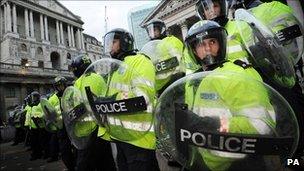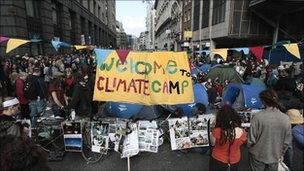Met Police wins appeal over G20 kettling tactics
- Published

Officers kettled protesters in Bishopsgate on 1 April 2009
The Metropolitan Police (Met) has won its appeal against a High Court ruling over kettling tactics used during the G20 demonstrations.
The High Court ruling had been won by Hannah McClure, a student, and Josh Moos, a campaigner for Plane Stupid.
They challenged the legality of restraint methods used against them in April 2009 when they were contained by officers in Bishopsgate.
But the Court of Appeal has now ruled against the High Court's decision.
Mr Moos said it was "a shame" the appeal judges could not see that the police were "out of control".
The High Court ruling, where officers were said to have used "unjustified force", led to a call from human rights lawyers for an "immediate change to police attitudes and tactics".
Police used the kettling tactic - where demonstrators are corralled inside police cordons and prevented from leaving - against the protesters in Bishopsgate, even though they had been peaceful.
'Imminent risk'
The Met said the kettling was necessary to keep violent demonstrators at the Royal Exchange from "hijacking" the more peaceful climate camp, attended by up to 5,000 people.
The High Court had ruled there had been no evidence of an imminent breach of the peace to justify the kettle, which was in place for more than four hours.

Demonstrators at the climate camp were kept in a tight police cordon for more than four hours
Mr Moos, who was part of a peaceful protest camp, said he had become dehydrated after being refused permission to leave.
When the police announced an appeal they made it clear the judgement did not outlaw kettling, and containment tactics would continue to be used "to prevent serious disorder and violence".
The Master of the Rolls Lord Neuberger, sitting in the Court of Appeal with Lord Justice Hughes and Lord Justice Sullivan, ruled against the High Court decision.
In his ruling,, external Lord Neuberger said the Met's appeal was being allowed because the Divisional Court (High Court) had "applied the wrong test when assessing whether there was an imminent risk of breach of the peace".
Rather than assessing the "reasonableness" of the view taken by the officer in charge on the day, the High Court judges had formed their own view, the Court of Appeal heard.
"Even if they decided that (the officer's) view was unreasonable, there was no valid basis for reaching such a decision," said Lord Neuberger.
The decision to contain the crowd of protesters at the climate camp was justifiable because of fears of the serious risk of them being joined by "dispersing demonstrators from another substantial crowd" which had been seriously violent and disorderly, the court heard.
Keith Vaz, chairman of the Commons Home Affairs Select Committee, welcomed the verdict, saying: "As the August riots and student protests highlighted last year, in order to appropriately respond to a situation of disorder, police must have available to them a wide array of tactics."
He said clear parameters were needed so that in the future both protesters and police officers know when kettling methods would be used.
- Published14 April 2011
- Published14 April 2011
- Published24 February 2011